
HIV/AIDS in Jamaica: Are The Kids Alright?
June 18th, 2016
My last post was about health issues, and it seems there is much more to say. This time I would like to touch on the issue of sexual and reproductive health, in particular among our youth.
I recently attended the annual Health for All forum, involving a number of non-governmental partners including Jamaica AIDS Support for Life, the Jamaica Youth Advocacy Network (JYAN), J-FLAG and Eve for Life; as well as UNAIDS and the Ministry of Health, among others. As usual, it was very well organized and packed with information – albeit rather long. I had to leave before the end, and missed the panel discussion. However, what I heard raised a few concerns for me. Quite a few. In fact, it’s hard to know where to start.
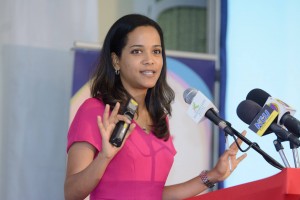
Marion Scott, Coordinator of the ALL IN program to end adolescent AIDS gave a presentation that was both enlightening and disturbing. (Photo: JYAN/Facebook)
This year, the theme was Putting Youth and Adolescents at the Heart of the HIV Response. Apart from those working in the field, there were quite a few young people there. I find it hard to identify teenagers these days, however; they often look older than their years.
Ms. Marion Scott is the Coordinator of ALL IN to #EndAdolescentAIDS at the Ministry of Health in Jamaica. ALL IN is a worldwide project funded by UNICEF. You can find out much more about it here. Two million adolescents (aged 10 – 19 years) are living with HIV/AIDS globally; every hour, 26 adolescents are infected. Despite all the progress made, this is fairly alarming. The fact is, while deaths from AIDS are generally declining globally (and quite rapidly), they are not declining in this age group, which constituted a demographic of some 500,000 in Jamaica, as of 2013.
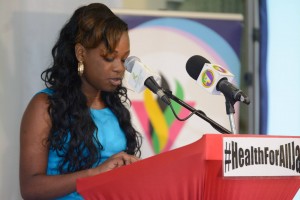
Nineteen year-old Andreen Williams, a client of Eve for Life, which supports young mothers living with HIV, gave a welcome at the “Health for All” forum. (Photo: JYAN/Facebook)
But, hold on…I thought HIV/AIDS was under control in Jamaica, you may ask? Yes, Ms. Scott informed us. New infections have been trending downwards since 2001 in Jamaica. Mother to child transmission has been virtually eliminated, with 98 per cent coverage. However, let us look at our youth and adolescents; again, the picture is not so rosy. Focusing on what the Health Ministry calls “key populations” – in other words, those groups that we really need to pay particular attention to – the estimated rates of HIV/AIDS among transgender adolescents (aged 15 to 19) is 27 per cent. Among young men who have sex with men, including bisexuals and gays in the same age group it is 14 per cent; and among young women (aged 16 – 24 years) who sell sex it is around 2.9 per cent. This is way above the average HIV/AIDS rate in Jamaica, which is around 1.5 per cent.
In addition to these specific groups, the Ministry is also concerned with those already living with HIV, teenage parents and children in state care – also clearly vulnerable groups. I found some of Ms. Scott’s other disclosures disconcerting. Condom use in this age group appears startlingly low, according to the Ministry’s estimates. HIV testing is also low. Young people do not seem to be accessing health care, and relevant information; what are the actual blocks here? The general lack of awareness and understanding is actually rather frightening; it does not bode well for the future if these trends continue. Mental health issues, Ms. Scott noted, are also connected, underlying problems that are often ignored. Boys are also “at significantly greater risk” than girls, she noted.
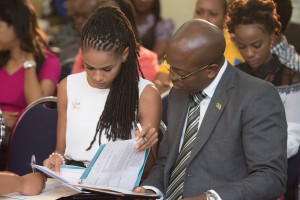
MC Sanneta Myrie goes over the program with guest speaker and State Minister in the Ministry of National Security Pearnel Charles Jr., who stressed that “unprecedented levels of collaboration” are needed to tackle adolescent HIV and AIDS. (Photo: JYAN/Facebook)
There is no doubt that greater innovation in outreach programs is needed. Also needed is a much sharper focus on health care programs – in particular sexual and reproductive health – for adolescents and youth. Is this happening yet? What is happening in our schools, for example? The brilliant and always-focused Dr. Pauline Chevannes-Vogel, who heads the National Family Planning Board, said at the forum that Comprehensive Sexual Health Education “is not sexualising young people and adolescents,” nor is it going to encourage them to have sex – unless they are having sex already. If they are already having sex, for goodness’ sake – they need the information to protect themselves. Doesn’t this make sense? I still don’t really have a handle on what is being taught in our schools, if anything; I understand condoms are not available in schools, because again that would “encourage” our youth. Meanwhile, too many of our young people continue experimenting, engaging in risky sexual activities, “playing it by ear” almost, without the proper guidance and advice. Then the adults turn round and label them “bad boys” and “bad girls.”
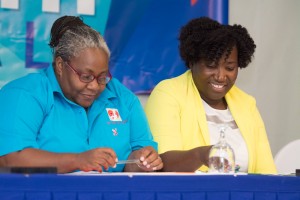
Two women who are doing incredible work in the field of HIV/AIDS: Program Manager at Eve for Life Joy Crawford (left) and Kandasi Levermore, Executive Director of Jamaica AIDS Support for Life. (Photo: JYAN/Facebook)
I have a sense that we are not getting through to our young people. I hope the ALL IN program will help to get some important messages out. Even more importantly, I hope that our educators, community-based organizations, our Christian conservatives, social workers – and families – will begin to see the light, and start to work together for the benefit of our youth. At present, it seems to me, we are letting them down badly and we are storing up some very bad things for our future.
A rock band in the 1960s called The Who had a good song defending the younger generation, called The Kids Are Alright. I am not sure whether our kids will be alright. Perhaps we had better start paying attention to them.
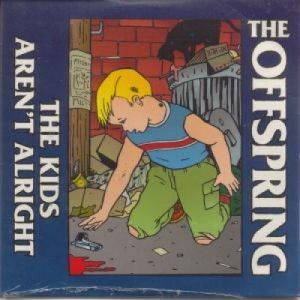
Some three decades after the Who’s version there was a more cynical punk song called “The Kids Aren’t Alright.” Are they, or not?
Tags: adolescents, ALL IN, bisexuals, children, commercial sex workers, Eve for Life, gay men, Health For All, HIV/AIDS, J-FLAG, Jamaica, Jamaica AIDS Support for Life, Jamaica Youth Advocacy Network, Marion Scott, Ministry of Health, National Family Planning Board, NGO, Paulette Chevannes-Vogel, sexual and reproductive health, teenagers, transgender, UNAIDS, UNICEF Jamaica, youth at risk
The Gleaner reserves the right not to publish comments that may be deemed libelous, derogatory or indecent.
To respond to The Gleaner please use the feedback form.
- We Are the Zoomers
- Living Online with Humans and Birds: NAOC 2020
- Human Trafficking and the Problem of Public Education
- Down Memory Lane
- Are We Ready to Recover from COVID-19?
- Road Safety Matters: Is Your Vehicle Safe?
- Sexual Harassment, Me Too, and the Minister’s Disturbing Giggle
- The Vulnerable Senior Citizens, Private Care Homes and COVID-19
- A Muddle Over Masks
- Here is Something Life-Saving You Can Do: Give Blood!


